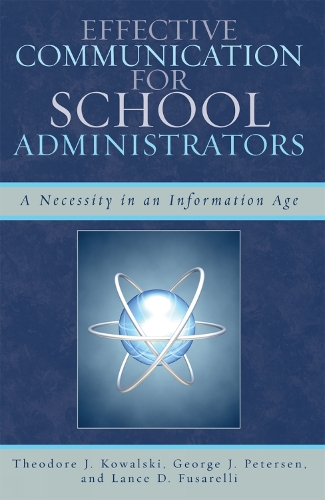
Effective Communication for School Administrators: A Necessity in an Information Age
(Paperback)
Publishing Details
Effective Communication for School Administrators: A Necessity in an Information Age
By (Author) Theodore J. Kowalski
By (author) George J. Petersen
By (author) Lance D. Fusarelli
Bloomsbury Publishing PLC
Rowman & Littlefield Education
15th March 2007
United States
Classifications
Professional and Scholarly
Non Fiction
Educational psychology
371.2011
Physical Properties
Paperback
254
Width 153mm, Height 230mm, Spine 19mm
390g
Description
Reforming schools in an information-based society has made communication an even more crucial skill for district and school administrators. Although communication has been identified as an essential area of practice, it has largely been ignored in the study of school administration. In Effective Communication for School Administrators: A Necessity in an Information Age, Kowalski, Petersen, and Fusarelli blend research, theory, and practice as they examine the critical nature of communication in contemporary practice for administrators. Divided into two parts, this book examines relationships among communication, public relations, and school reform and addresses effective communicative behavior in learning organization, democratic leadership, organizational networks, conflict, positive relationships, and site-based management. Effective Communication for School Administrators is truly a unique text for education professionals and school administrators, as well as those wishing to communicate more successfully.
Reviews
Improved leadership, implementation, and achievement in education all require good communication: citizens to schools, administrators with teachers, and teachers with children. This important book explains and illustrates in the 'information age' just howto get the word out: the what, to what ends, using what means (including the latest theories & technologies), all for the benefit of education and society.... -- Bruce S. Cooper, PhD, emeritus professor and vice chair, Division of Administration, Policy and Urban Education, Fordham University
Kowalski et al. consider the importance of communication for school administrators. They argue that effective communication is linked to effective reform and discuss communication in connection with public relations and school reform, as well as organizational improvement and culture change. They consider it in the context of an information-based and reform -minded society and detail applications of relational communication: making a school a learning organization, practicing democratic leadership, and performing critical tasks such as visioning and planning, managing conflict, building positive relationships, and working with school councils. This book is for courses taken by aspiring and practicing school administrators. * Reference and Research Book News *
No doubt, communication has always been essential to educational leaders. But the unique combination of factors in which contemporary leaders find themselvesan information age, a reform and accountability arena, and learning communitiesmakes developing communication skills more critical than ever. Kowalski, Petersen, and Fusarelli have created a research-based and practical text that acknowledges these unique contexts and provides an excellent resource for superintendents, principals, and other school leaders for integrating effective communication in their work. -- Gary M. Crow, professor and chair, Department of Educational Leadership and Policy, Florida State University, Tallahassee
Improved leadership, implementation, and achievement in education all require good communication: citizens to schools, administrators with teachers, and teachers with children. This important book explains and illustrates in the 'information age' just how to get the word out: the what, to what ends, using what means (including the latest theories & technologies), all for the benefit of education and society. -- Bruce S. Cooper, PhD, emeritus professor and vice chair, Division of Administration, Policy and Urban Education, Fordham University
Author Bio
Theodore J. Kowalski is the Kuntz Family Chair in educational administration at the University of Dayton, Ohio. A former teacher, principal, superintendent, and college dean, he is the author of 29 books and over 180 book chapters, journal articles, and research studies.
George J. Petersen is professor and chair of educational leadership at California Polytechnic State University, San Luis Obispo. He was previously on the faculty at the University of Missouri and served as associate executive director of the University Council for Educational Administration.
Lance D. Fusarelli is associate professor and chair of educational leadership at North Carolina State University, Raleigh. He was formerly on the faculty at Fordham University, New York.
